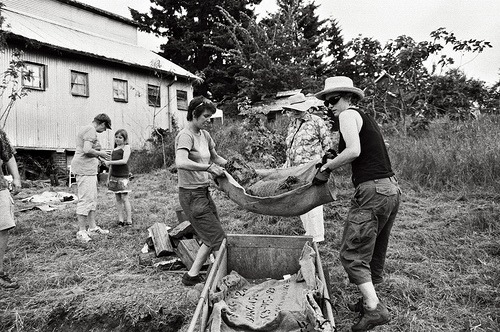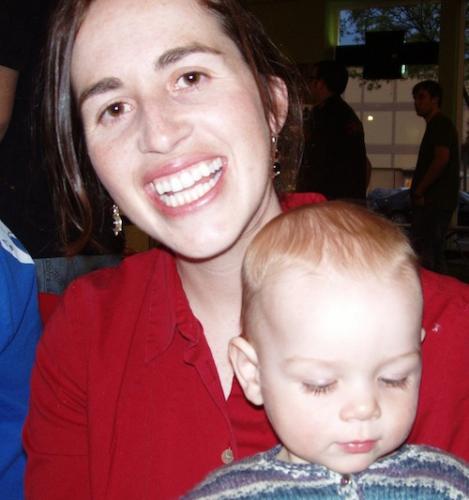Foster Road in Southeast Portland, Oregon is lined with wrecking yards, auto body shops, gas stations, cheap appliance stores, and vacant lots.
It’s not the place you’d expect to find a six-acre working farm or a ten-acre wetland preserve. But that’s where Zenger Farm is, nestled between a huge warehouse and a cluster of residential housing.
Zenger Farm is owned by the City of Portland’s Bureau of Environmental Services and is run by the non-profit group Friends of Zenger Farm. The non-profit does employ a farm director and several others. But the 40 people who come out each day at dawn and dusk to tend the farm’s almost 70 chickens aren’t paid.
They’re members of the Eastside Egg Cooperative, and they volunteer to feed and care for Zenger’s hens in exchange for fresh eggs and a tiny slice of farm life.
 How to Start an Egg Co-op
How to Start an Egg Co-op
Eastside Egg Cooperative is the brainchild of Patrick Barber and Holly McGuire, a married couple, who live in a busy part of Northeast Portland. They’d previously kept a small flock of backyard chickens and had been surprised at how relatively easy keeping chickens is.
When their Community Supported Agriculture (CSA) farm stopped supplying eggs in the spring of 2007, they casually mentioned to a farmer at the CSA pickup that they thought it would be neat if all the CSA members got together to tend a flock of chickens, in exchange for fresh eggs.
That farmer happened to be Laura Masterson, a farmer at Zenger, and it so happened that Zenger Farm had just gotten a three-year grant from Heifer Foundation to add livestock to the farm.
Masterson told Barber and McGuire that Zenger Farm would pay for the farm’s first flock of 50 Barred Rock hens, as well as organic feed, bedding, and building materials for a chicken coop—on the condition that they recruit enough volunteers to cover 14 weekly chicken-keeping shifts. The folks on the morning shift would need to let the chickens out and feed them, and the folks on the evening shift would collect the eggs and lock the chickens inside the coop for the night.
Barber and McGuire put the word out and hung signs around at area coffee shops. In no time at all, they had enough volunteers to cover every shift. With all the pieces in place, they had a very clear idea of how they wanted to organize the co-op. “We kind of came in guns blazing and said here it is, this is what it’s going to do, where it’s going to go,” Barber says.

McGuire and Barber were astounded by the co-op members’ dedication. “It was a really interesting group the first year of people who were willing to take a chance,” Barber says. With very few exceptions, everyone showed up to their shifts and did what needed to be done.
Nine months later, The Oregonian, Portland’s daily newspaper, ran a story about the cooperative. The next morning Barber and McGuire got 300 emails from people interested in volunteering. They trained about 100 volunteers that spring, although not all of them ended up working with the co-op. They also started charging a sliding membership fee of $60-120 a year to cover the cost of feed.
Oasis in the City
Once you park your car in the lot, or secure your bicycle to one of the racks in the artfully-sculpted bike-parking area, walk past the newly-remodeled, solar-powered farm house, and take in the view of vegetables, farm buildings, and wetlands, it’s not hard to understand why someone would volunteer to go to Zenger Farm each week—even at the crack of dawn.

On your way to meet the farm’s newest flock of hens—35 black Australorps—you can meander through the paths of the “Children’s Garden,” where chard, kale and squash are still growing, and yellowing vines cling to handmade grape arbors.
The Austalorps are contained in a solar-powered electric fence. Their black feathers take on an iridescent green sheen when the sun hits them. As with most hens, it’s entertaining to watch them go about their business of pecking and scratching. One of them occasionally flutters over the fence, causing the others to squawk and race down a gentle slope toward three turkeys that are strutting and fanning their feathers on the other side of the fence.
 The Australorps aren’t quite full grown yet. One of them just laid the flock’s first egg last week. But soon they’ll be integrated into Zenger’s established chicken flock, a mix of 32 Black Stars, Red Stars, Barred Rocks, Buff Orpingtons, and one Ameraucana, who are enclosed in another solar-powered electric fence on the other side of an aluminum-sided barn.
The Australorps aren’t quite full grown yet. One of them just laid the flock’s first egg last week. But soon they’ll be integrated into Zenger’s established chicken flock, a mix of 32 Black Stars, Red Stars, Barred Rocks, Buff Orpingtons, and one Ameraucana, who are enclosed in another solar-powered electric fence on the other side of an aluminum-sided barn.
Many of Zenger’s older hens are missing feathers, either because they’re molting or because they’re at the bottom of the pecking order. They sleep and lay eggs in a mobile coop—a long red and white structure with an urban flair: It’s outfitted with custom bicycle forks designed by Sacha White, the owner of Portland’s Vanilla Bicycles, and wheels and rims donated by Surly Bikes.
The retrofitted bicycle tires enable the farmers at Zenger to move the hens to a new plot of land every two to three weeks, which is crucial, because the chickens have an important job: They keep the bindweed at bay, lay down their nitrogen-rich manure, and ready the land for planting. And you can see what that looks like, in a video shot by Holly McGuire:
Moreover, Zenger Farm is an educational farm. School children come out throughout the week to learn about farm life and wetlands, and about half of the students help out with farm chores. The chickens are a big part of those educational programs.
Sara Cogan, Zenger’s Farm Director, who also recently took over managing the Eastside Egg Cooperative, says that because the chickens are such an important part of the farm, the co-op members who tend to them make an invaluable contribution to Zenger’s operations.
Cogan, like most everything else at Zenger Farm, exemplifies a mix of urban and rural. Her hair is short, her skin is sun-chapped, and she wears a flannel shirt and work boots. But there’s something decidedly urban about her, probably because she lives in the city and takes the Light Rail to work every morning.
Urban Agriculture Exercise
Barber and McGuire handed over management of the co-op to Cogan in September, because coordinating it had turned into a more administrative job, and it made sense for the Farm Director to take it on.
But Barber and McGuire still talk to Cogan (pictured below, kissing a chicken) about once a week to answer questions. And they’re all thrilled by the success of the Eastside Egg Cooperative.
 McGuire says she thinks of the co-op as an exercise. It’s an urban agriculture project that is not “in the community gardening model, with everyone doing their own thing.” Nor is it in the survivalist model, where people are trying to grow all of their own food. “Urban agriculture requires a pooling of resources and labor and this mostly is a chance for people to learn about doing that,” McGuire says.
McGuire says she thinks of the co-op as an exercise. It’s an urban agriculture project that is not “in the community gardening model, with everyone doing their own thing.” Nor is it in the survivalist model, where people are trying to grow all of their own food. “Urban agriculture requires a pooling of resources and labor and this mostly is a chance for people to learn about doing that,” McGuire says.
There is a practical benefit, of course: In the summer, members get a dozen eggs a week. In the winter, when hens lay fewer eggs because the days are shorter, they get about a half dozen.
But Cogan says, “Eggs [are] fresh and tasty and delicious, but they aren’t going to keep you coming out in the winter when there’s a couple feet of snow on the ground, hauling water out to the chickens. The people who are involved in the co-op are in it because they love coming out to the farm. They love interacting with the chickens.”
In the end, says Cogan, the Eastside Egg Cooperative is about “sharing in labor and sharing in goods, and not exchanging money, being involved in the actual production of food and taking care of animals. It’s really amazing.”
The first four photos are by Patrick Barber; the last two were taken by Abby Quillen.









